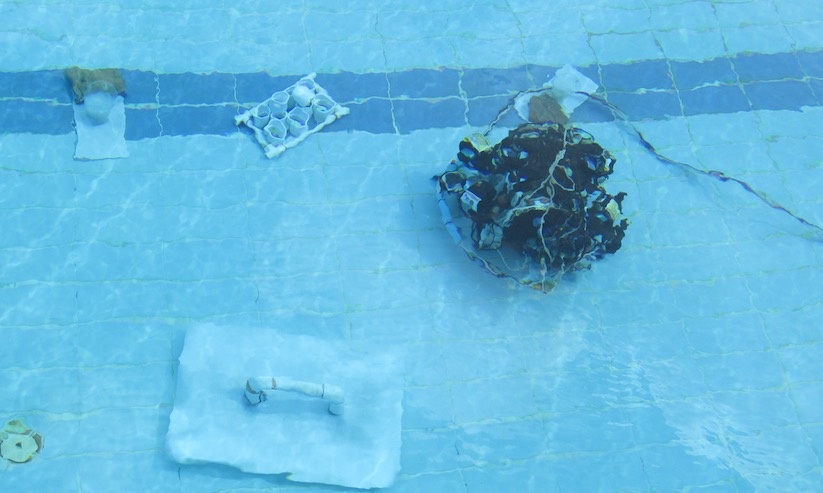California calls for 8 ROV robot winners

Remotely operated vehicles (ROVs) skimmed underneath the surface of a swimming pool, surrounded by students with joysticks and controllers in front of their laptops.
It was the main scene of the ROV Arab Competition in Alexandria, a contest held April 6-8 pitting young inventors of underwater robots from across the region against each other.
The stakes were high: the winners now proceed to the international competition in California in June.
Of the 52 teams, eight were from other Arab countries including Morocco, Tunisia, Jordan and Saudi Arabia, and all had to ‘sell’ their ROV to the judges as a company, and undertake missions.
Missions were simulations of typical underwater ROV tasks, such as taking samples, opening doors, and moving objects from one place to another in the swimming pool ‘playground’.
Teams had 15 minutes to complete a mission, forcing them to solve any possible problems on the spot so stress levels were high: teams frequently faced problems with their devices, such as grippers or bluetooth connections.
Points were given for performance during the mission, safety (important when you’re dealing with electronics underwater), size and weight (small is better), and for the presentation.

The winners were:
Vortex (Alexandria University)
Torpedo (Alexandria University)
Zoom engineers (Saudi Arabia)
Invictus (Arab Academy for Science Technology and Maritime Transport)
High school teams:
Robo-tech (Egypt)
Sea pearl (Egypt
Eureka C Shark (Jordan)
Steve ROV was one of the children’s teams and will go to California as a spectator.
Ibrahim Yousry Habib, member of team Vortex and in his final year of electromechanical engineering at Alexandria University, said he “dreamt about winning every night”.
“I worked for this for three years, it makes me very happy,” he said, who was participating for the third time. It’s Vortex’s second year in the contest, and last year they came sixth.
Habib believes they owe their victory to having built a very small and light ROV, equipped with two arms that were operated through a compressed air mechanism.

Unteachable skills
But the ROV competition is much more than just a ticket to California, says Ahmed Shenawy, Arab Academy for Science Technology and Maritime Transport associate professor, and ROV Arab Competition judge and organiser.
“There is a problem in Egypt,” said Shenawy. “In the labor market there is a demand for 4,000 engineers each month, especially in the fields of embedded systems and hardware, and only 5 percent of that is filled.”
Fresh graduates lacked the appropriate experience to fill those gaps.
“The competition prepares engineering students to be problem solvers as part of a team in a competitive environment and with a limited budget.”
Past winners
The Academy was behind the first ROV Arab Competition in 2012.
Shenawy described the first edition as “a first trial, and not so professional”.
It’s grown to universities all over Egypt, although the marine tech departments at Alexandria University and the Academy are still the biggest competitors, and since last year it’s gone regional.
“Last year there was one team from outside Egypt, this year we have eight,” Shenawy said. “The level of Egyptian teams developed very fast.”
In 2014 Alexandria University team Aquaphoton came sixth in the global final, and last year the Academy’s Turbini team came in at seventh - despite being down to three members as half of the team were refused visas to the US.

The theory is working
The objective beyond the competition – preparing students for a job in the industry – seems to be materializing.
After their performance in 2014, the Aquaphoton team established a company and started developing a commercial ROV for the petroleum and shipping sectors. “We hope to finish our first [commercial] ROV in two months,” said Omar Ibn Khattab Abdullah, one of the seven cofounders.

They started with building the know-how and technology while providing different services to sustain the company, such as an online store for parts, do-it-yourself kits for children, and consultancy.
Most of their clients at this stage are students and individuals interested in building their own ROVs.
Aquaphoton also established its own training academy, through which it sources and trains students from Alexandria University to participate in the competition under the company’s name. This year saw an Aquaphoton-sponsored team competing.
Creating a local industry
Abdullah said there were no local companies offering ROV services in Egypt and Aquaphoton would be able to provide a cheaper and viable local alternative, both as a service provider and as a ROV manufacturer.
Funding for R&D came from the SME fund of the government’s Academy for Scientific Research and Technology. Abdullah preferred not to mention how much they received but said building a ROV was expensive.
“Once we prove to have an efficient ROV, we can source more funding,” he said.
Shenawy envisions a growing market for ROV services in Egypt, referring to the huge offshore gas field discoveries in the past years. With no local ROV options, companies operating these fields were dependent on expensive foreign providers, he said.
Aquaphoton is not alone in its ambitions.
One of this year’s winning teams, Vortex, teamed up with Alexandria-based marine service provider Oxydive in the competition, and aims to start as a company within a year. Team member Hisham Said hoped they would become “even better” than Aquaphoton.
Feature image via Wamda.


